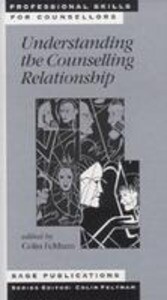
Zustellung: Fr, 24.01. - Do, 30.01.25
Versand in 3-4 Wochen
VersandkostenfreiBestellen & in Filiale abholen:
`This book presents contrasting views of the relationship between the counsellor, or therapist, and the client, as held by practitioners from diverse theoretical orientations. Each chapter clarifies and considers the elements of the counselling relationship which have the most bearing on therapeutic practice and the strengths of each are highlighted in terms of understanding, theory and skills' - New Therapist
It is now widely accepted that the therapeutic relationship - referred to here as the counselling relationship - may be the most significant element in effective practice. Understanding the Counselling Relationship presents contrasting views of the relationship between the counsellor or therapist and the client, as held by practitioners from diverse theoretical orientations.
Each chapter clarifies and considers the elements of the counselling relationship which have most bearing on therapeutic practice. The strengths of each position are highlighted in terms of understanding, theory and skills. The relevance of certain psychological, sociological and research-based issues for practitioners from a variety of theoretical backgrounds are also considered.
It is now widely accepted that the therapeutic relationship - referred to here as the counselling relationship - may be the most significant element in effective practice. Understanding the Counselling Relationship presents contrasting views of the relationship between the counsellor or therapist and the client, as held by practitioners from diverse theoretical orientations.
Each chapter clarifies and considers the elements of the counselling relationship which have most bearing on therapeutic practice. The strengths of each position are highlighted in terms of understanding, theory and skills. The relevance of certain psychological, sociological and research-based issues for practitioners from a variety of theoretical backgrounds are also considered.
Inhaltsverzeichnis
Introduction - Colin Feltham
Contextualizing the Therapeutic Relationship - Colin Feltham
The Relationship in Psychodynamic Counselling - Jeremy Holmes
The Relationship in Person-Centred Counselling - Paul Wilkins
Dialogical Psychotherapy - Maurice Friedman
`I m OK, Yoüre OK - and They re OK - Keith Tudor
Therapeatic Relationships in Transactional Analysis
The Therapeutic Relationship in Cognitive Therapy - Diana Sanders and Frank Wills
The Relationship in Multimodal Therapy - Stephen Palmer
The Counselling Relationship and Psychological Type - Rowan Bayne
Professional and Socio-Cultural Aspects of the Counselling Relationship - Janice Russell
Learning from Research into the Counselling Relationship - Roxane Agnew-Davies
Contextualizing the Therapeutic Relationship - Colin Feltham
The Relationship in Psychodynamic Counselling - Jeremy Holmes
The Relationship in Person-Centred Counselling - Paul Wilkins
Dialogical Psychotherapy - Maurice Friedman
`I m OK, Yoüre OK - and They re OK - Keith Tudor
Therapeatic Relationships in Transactional Analysis
The Therapeutic Relationship in Cognitive Therapy - Diana Sanders and Frank Wills
The Relationship in Multimodal Therapy - Stephen Palmer
The Counselling Relationship and Psychological Type - Rowan Bayne
Professional and Socio-Cultural Aspects of the Counselling Relationship - Janice Russell
Learning from Research into the Counselling Relationship - Roxane Agnew-Davies
Mehr aus dieser Reihe
Produktdetails
Erscheinungsdatum
13. September 1999
Sprache
englisch
Seitenanzahl
256
Reihe
Professional Skills for Counsellors Series
Herausgegeben von
Colin Feltham
Verlag/Hersteller
Produktart
gebunden
Gewicht
170 g
ISBN
9780761957843
Entdecken Sie mehr
Pressestimmen
`This book presents contrasting views of the relationship between the counsellor, or therapist, and the client, as held by practioners from diverse theoretical orientations. Each chapter clarifies and considers the elements of the counselling relationship which have the most bearing on therapeutic practice and the strengths of each are highlighted in terms of understanding, theory and skills' - New Therapist
`This book is a timely contribution to the debate regarding what makes counselling work as we are forced to consider by purchasers and purveyors of counselling the efficacy of what we offer.... The book has a house style that makes it clear and accessible in the field and raises some interesting and thought-provoking issues' - British Journal of Guidance & Counselling
`This book is a timely contribution to the debate regarding what makes counselling work as we are forced to consider by purchasers and purveyors of counselling the efficacy of what we offer.... The book has a house style that makes it clear and accessible in the field and raises some interesting and thought-provoking issues' - British Journal of Guidance & Counselling
Bewertungen
0 Bewertungen
Es wurden noch keine Bewertungen abgegeben. Schreiben Sie die erste Bewertung zu "Understanding the Counselling Relationship" und helfen Sie damit anderen bei der Kaufentscheidung.





















